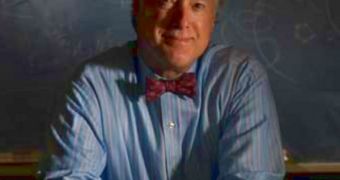Although to many Roger McWilliams appears to be a person that stepped out of the past, he is actually at the forefront of modern science, creating extremely advanced laser devices.
After 30 years of work, the bow tie-wearing expert is now investigating plasma lasers, which produce “matter so hot it's ionized.”
McWilliams is professor of physics and astronomy at the University of California in Irvine (UCI), where he conducted most of his life's work.
“Since much of the known matter in the universe is plasma, there's more than enough to spend decades studying. I'm always looking for new ways of doing things with plasma,” he says.
“The invention of new tools often leads to new physics. I focus on those that have social utility. In science, it's nice to contribute to an area that helps other people,” the expert goes on to say.
His devices are not only inventions, but also helpful tools, that have already found practical applications in the fields of telecommunications and medicine, among many others.
One of the lasers McWilliams created was used by another UCI expert, ophthalmologist Dr. Roger Steinert, to develop a pioneering approach to laser eye surgery.
“Lasers that create plasma now are workhorses in treating eye disorders,” says the expert, who is based at the UCI Medical Center.
“They can act like a clean scalpel, generating minimal heat or collateral damage, while reaching inside the eye with no incision. His [McWilliams'] work has greatly affected my own for nearly three decades,” Steinert explains.
McWilliams also takes on a different approach during classes and exams, asking his students to perform practical applications, with relevance in real life, and also to experiments on their own.
“Education should have relevance to real life. It's not some fuzzy-haired guy in a bow tie standing at a podium in a windowless classroom,” he explains.
“Physics is about the world we live in, and making it a better place,” McWilliams says.
His contribution to the field of laser research have thus far been used in creating better optic fiber data transmission across oceanic cables carrying Internet signals. But this is just one example.
The expert also collaborated with numerous companies founded by former students or colleagues.
For his contribution to science, McWilliams was presented with the Lauds & Laurels faculty achievement award this May.

 14 DAY TRIAL //
14 DAY TRIAL //